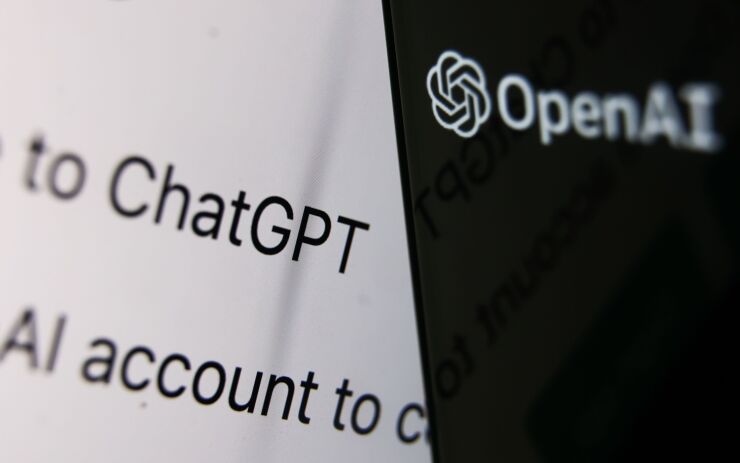Career development is a constantly-evolving landscape of skillsets and tools. Forward-thinking professionals need to educate their workforce to meet the demands of each new wave of technology.
Generative AI is one such technology that will transform the workplace, freeing employees of some of their mundane daily tasks.
John Scott, head of learning and design at workplace educational platform MasterClass at Work, said in an interview with Employee Benefit News'
"If it understands a very clear context about the task and the objective, and it's given the information that it needs to automate lower-level tasks, it opens up more time for employees to do higher-order thinking and higher-level tasks that are going to be more valuable to business and more motivating to them as an individual," Scott said.
Read more:
On another front, a crucial part of career development that many employers often overlook is the importance of
"There's a misconception that older workers don't want to be retrained or aren't looking for tuition, [but] it's quite the opposite," Michelle Westfort, chief strategy and solutions officer at InStride, said in an interview with EBN's
Following are expert insights on how companies can better support the development of their employees and what avenues are available for current and future members of the workforce to boost their resumes.

47% of Gen Z get better career advice from ChatGPT than from their managers
Article by
Thanks to technology, young workers have answers to all types of questions at their fingertips. But
Fifty-four percent of employees feel completely on their own at their organization when it comes to career development, according to a recent survey from career development platform Intoo. Gen Z employees have even
"Gen Zers are having a different experience as they go into their careers," says Mira Greenland, chief revenue officer at Intoo. "This generation more than any other before is really craving meaningful work, rapid opportunities and regular feedback. They've grown up with these vastly different digitally connected environments where they have everything so immediately available and personalized. They're looking for management to treat them in that same way."

Spring clean your career: How to set work goals you'll actually reach
Article by
It's easy to become stagnant when it comes to professional growth, but with the right approach, employees can set
Fifty percent of people will set a career goal for their year, according to Gallup, and while the new year is the most typical time to get those ambitions in order, it's important to regularly revisit what you
"One of the reasons people don't end up achieving their professional goals is that they only visit it once a year," says Sarah Doody, career strategist and founder of Career Strategy Lab, a career coaching platform. "Doing this on an ongoing basis, and not just two days before your performance review, is a way to help ensure that you actually make progress."

HR leaders and recruiters reveal the secrets to early career success
Article by
Upon entering the workforce, young workers are often
In 2024, Gen Zers will make up more of the workforce than baby boomers, according to a forecast report from job search website Glassdoor. What's more, 92% of Gen Z employees said they were considering moving on from their current jobs in 2024, according to a survey from job search platform LinkedIn, which means it has never been more important for
Yet while it's the perfect time to experiment and some missteps are a given, without a good understanding of how every stage of the employment process works, these young employees risk setting themselves — and their careers — back unnecessarily.

Ask for that promotion: 11 of employees biggest career regrets
Article by
They say hindsight is 20/20 — and as it turns out, this is true for
Sixty-six percent of workers experience
"I don't think it's possible to go through your entire career without a single regret," says Heather O'Neill, career expert at Resume Now. "But I think you can practice regret reduction."

Being isolated at work can damage your career: 5 ways to be more social
Article by
It is not as easy — or as tempting — as it used to be to
According to a TopResume
But too much isolation can be damaging to employees' mental health and their professional growth. Social isolation can lead to sleeplessness, anxiety and depression, as well as limited networking opportunities, reduced visibility and recognition in the workplace, and a lack of connection to colleagues, information and resources at work, says Amanda Augustine, a career expert at TopResume.

20% of queer employees fear coming out will damage their careers
Article by
Despite increased efforts by employers
Sixty-three percent of LGBTQ people say
"Societally, there's been a lot of progress in terms of LGBTQ social support both at work and with the general public," says Dr. Jenna Brownfield, a licensed psychologist who specializes in therapy for the LGBTQ community. "But it's still hard to be LGBTQ in our world and it continues to be politicized."

5 good habits essential for a successful career
Article by
Kicking a bad habit is hard, but sometimes,
Forty-six percent of employees attribute their career success to having the right habits, according to a recent report from professional training and coaching platform Crucial Learning. This compares to just 22% of employees that credited the decisions they made and the 24% who chalked it up to natural talent, meaning that building a healthy work routine is twice as critical for
"If you look at your outcomes and results at work — good or bad — as well as your career and your relationships, so much of all of it is determined not by the things you do periodically but by the things you do habitually," says Justin Hale, a principal consultant in learning design and research at Crucial Learning. "So addressing those habitual behaviors is really the leverage point to trying to change your results long term."

How financial advisers can assist clients in successfully navigating career changes
Article by
The potential of an impending job change, whether voluntary or involuntary, is on the minds of many employees these days.
The share of people who think they're likely to be unemployed in the next four months reached a record high in a recent
Financial advisers who have experience helping their clients successfully move into a new phase of their professional lives say figuring out what is important can help clarify the steps they need to take to prepare for this transition.

Gen Z's career motivations have evolved. Here's how
Article by
Gen Zers have garnered an unfair
Individuals in this generation were generally born between 1997 and 2012 so the group ranges from children who are almost entering high school to those who have been in the workforce for a few years.
When it comes to career aspirations, 69% of Gen Z want to make enough money to live comfortably, according to data from workplace insights platform Statista, with 31% saying they want to

Here's how to explain career gaps when job seeking
Article by
Making the decision to
Sixty-nine percent of hiring managers worry about
"In the past, gaps were seen as a major red flag that could significantly hurt a candidate's chances because they illustrated an inability to find or maintain paid employment," says Eva Chan, lead career expert at Resume Genius. "Today, while employers still frown upon unexplained breaks in work history for the same reason, [most] of them no longer view them as dealbreakers."





